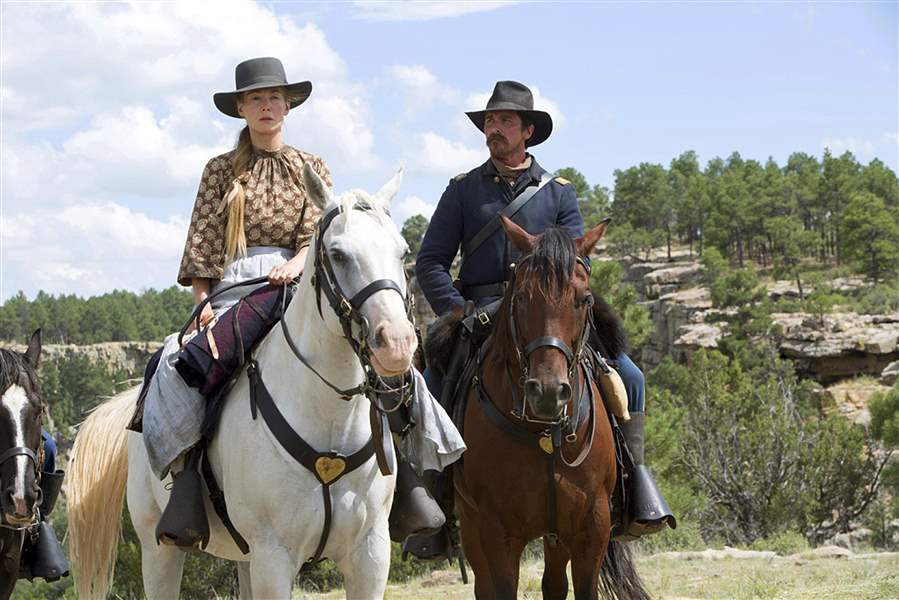
Testament of hope: 'Hostiles' a tale of willpower in a violent world
1/25/2018
This image released by Entertainment Studios Motion Pictures shows Rosamund Pike, left, and Christian Bale in a scene from "Hostiles."
ASSOCIATED PRESS
The first time I watched Hostiles, writer-director Scott Cooper’s violent post-Civil War Western, I was taken aback at how grim and unrelenting it was, like a Quentin Tarantino film absent the dark humor and irony but with all of the guns, knives, and blood.
Hostiles stars Christian Bale as a deeply flawed yet legendary Army captain named Joseph Blocker with an unconscionable past — and he’s the film’s protagonist.
I watched Hostiles again this week, more than two months after my first screening, and was surprised once more at my reaction to it. No longer bludgeoned by the bleakness of it all — or perhaps innerved by it — I saw Cooper’s neo-Western manifest itself in far less stark terms; Hostiles is much more than a somber tale of those beaten down by vile acts of inhumanity, including their own, in a violent and unforgiving world, but a testament to their magnificent will and purpose to slog and fight through these travails in the faint hope of reaching something better.
Trailer: Hostiles
Hostiles
Directed and written by Scott Cooper. An Entertainment Studios Motion Pictures release playing at Franklin Park, Fallen Timbers, and Levis Commons. Rated R for strong violence and language. Running time: 134 minutes.
Critic’s rating: ★★★★
Cast: Christian Bale, Rosamund Pike, Wes Studi, Rory Cochrane, Jonathan Majors, Jesse Plemons, and Timothée Chalamet.
Paradise, in fact, is literally and metaphorically the ultimate destination point in Hostiles, as Blocker is ordered against his will to escort dying Apache Chief Yellow Hawk (Wes Studi) and his small family from an Army outpost in New Mexico hundreds of miles north across dangerous lands to a final resting place in Montana, Apache tribal land.
Accompanying them are a handful of soldiers; some like Master Sergeant Metz (Rory Cochrane) and Corporal Woodsen (Jonathan Majors) are longtime and fiercely loyal companions of Blocker, while others such as Lieutenant Kidder (Jesse Plemons) and Private DeJardin (Timothée Chalamet) are meeting him for the first time.
Along this journey there will be two significant additions to the party as well:
Rosalie Quaid (Rosamund Pike), a despondent woman left alone and nearly broken after the murder of her family by a bloodthirsty gang of Comanches — the film opens with this horrific deed.
And Sergeant Wills (Ben Foster), a soldier and convicted murderer whom Blocker is asked to deliver to prison, where Wills will be executed for his crimes. These two soldiers have a history, with Wills having served under Blocker’s command. Wills’ arrival in the story is timed just as Blocker is transitioning from someone who views his violent past in less heroic terms and his enemies as barbarous animals.
An elite actor who still pushes himself and his craft, Bale’s tremendous performance is a showcase of restraint and subtlety. Captain Blocker is a low talker with a limited emotional vocabulary. Even when his soldierly veneer does crack, as Blocker, alone in the New Mexico desert, screams at the fates for being forced to carry out this mission to save his sworn enemy, Cooper mutes the angry and saddened cries in favor of rumbling thunder from above.
The filmmaker later juxtaposes that bottled-up emotion with full-throated wails of anguish and despair, as a heartbroken Quaid, with the fresh dirt mounds of her buried family in front of her, allows the grief to pour out.
Quaid’s path to recovery, that place where she is more whole than not, is itself a test of survival and resolve. Quaid doesn’t have Blocker’s stoicism, but is nonetheless cautious and measured, with a calloused strength slowly revealed through Pike’s gritty and moving performance.
Cooper, best known as the writer-director of 2009’s Crazy Heart, in fact, gives most every character in this Western a pertinent history or role to serve in the film. Sergeant Metz, for example, fears he is suffering from “the melancholia,” not so much in the regret of those he killed, as he tells Lieutenant Kidder later, but the sadness that comes with the deaths of those soldiers and friends.
Foster, as he often does, jolts the film with a dangerous and manic energy, while Studi is equally effective as a leader of quiet regret, solemn wisdom, and silent pain as he faces mortality with cancer eating away at his body.
The striking cinematography by Masanobu Takayanagi, enhances Hostile’s vivid contrast between what’s beautiful and ugly in this world, and Cooper’s screenplay, based on a manuscript written by Donald Stewart (Missing) in the 1980s, is a challenging balance between extreme violence and thoughtful reflection.
During a quiet campfire moment between Quaid and Blocker midway into their journey, she asks him if he believes in the Lord.
“Yes, I do, Mrs. Quaid,” he says. “But he’s been blind to what’s going on out here for a long time.”
Quaid, in a soft voice, firmly replies: “I see that. But I have to believe that it’s times like these that strengthen our bond with him.
“If I did not have faith, what would I have?”
Contact Kirk Baird at kbaird@theblade.com or 419-724-6734.